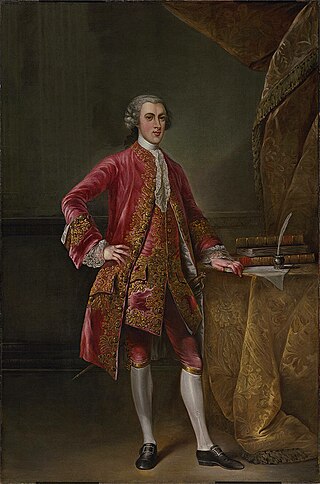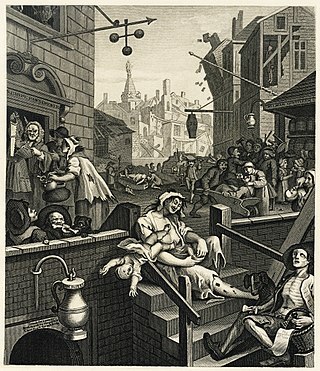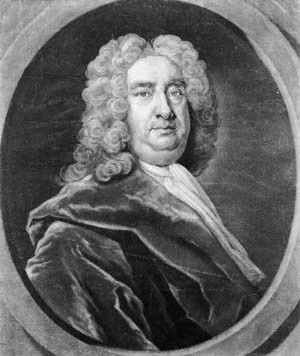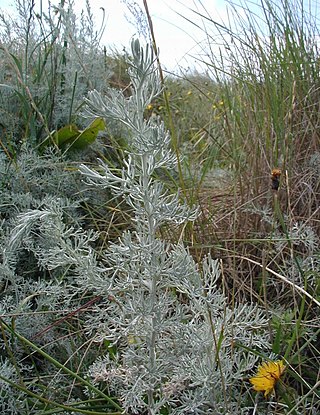
Stout is a type of dark beer, that is generally warm fermented, such as dry stout, oatmeal stout, milk stout and imperial stout.

The Province of Maryland was an English and later British colony in North America from 1634 until 1776, when the province was one of the Thirteen Colonies that joined in supporting the American Revolution against Great Britain. In 1781, Maryland was the 13th signatory to the Articles of Confederation. The province's first settlement and capital was in St. Mary's City, located at the southern end of St. Mary's County, a peninsula in the Chesapeake Bay bordered by four tidal rivers.

William Whitehead was an English poet and playwright. He became Poet Laureate in December 1757 after Thomas Gray declined the position.
Sea Pictures, Op. 37 is a song cycle by Sir Edward Elgar consisting of five songs written by various poets. It was set for contralto and orchestra, though a distinct version for piano was often performed by Elgar. Many mezzo-sopranos have sung the piece.

Steak and kidney pie is a popular British dish. It is a savoury pie filled principally with a mixture of diced beef, diced kidney and onion. Its contents are generally similar to those of steak and kidney puddings.

Frederick Calvert, 6th Baron Baltimore, styled The Hon. Frederick Calvert until 1751, was an English nobleman and last in line of the Barons Baltimore. Although he exercised almost feudal power in the Province of Maryland, he never once set foot in the colony, and unlike his father, he took little interest in politics, treating his estates, including Maryland, largely as sources of revenue to support his extravagant, often scandalous lifestyle. In 1768 he was accused of abduction and rape by Sarah Woodcock, a noted beauty who kept a milliner's shop at Tower Hill. The jury acquitted Calvert, but he left England soon afterwards, and never recovered from the public scandal that surrounded the trial. Dogged by the criticism and poor health, he contracted a fever and died in Naples at the age of 40.

The Gin Craze was a period in the first half of the 18th century when the consumption of gin increased rapidly in Great Britain, especially in London. Daniel Defoe commented: "the Distillers have found out a way to hit the palate of the Poor, by their new fashion'd compound Waters called Geneva, so that the common People seem not to value the French-brandy as usual, and even not to desire it".
"We Wish You a Merry Christmas" is an English Christmas carol, listed as numbers 230 and 9681 in the Roud Folk Song Index. The famous version of the carol is from the English West Country.

George Cheyne, M.D. R.C. E.d. R.S.S. (1672–1743), was a pioneering physician, early proto-psychiatrist, philosopher and mathematician.
"Remember Me"/"I Am a Cider Drinker" was a split single released by British Sea Power and The Wurzels. The 7" single features The Wurzels covering BSP's "Remember Me" and BSP covering The Wurzels' 1976 hit "I Am a Cider Drinker". The release was limited to 1,966 and only available on BSP's November 2005 tour or through their official website.
George Henry Lee I, 2nd Earl of Lichfield (1690–1743) was a younger son of Edward Henry Lee, 1st Earl of Lichfield and his wife Charlotte Fitzroy, an illegitimate daughter of Charles II by his mistress, the celebrated courtesan Barbara Villiers. On 14 July 1716 George Henry Lee succeeded his father as the 2nd Earl of Lichfield.

Steak and kidney pudding is a traditional British main course in which beef steak and beef, veal, pork or lamb kidney are enclosed in suet pastry and slow-steamed on a stovetop.

The Devon is a traditional British breed of beef cattle. It originated in, and is named for, the county of Devon in the West Country of England. It is a deep rich red in colour, and so may be known as the Devon Ruby, Ruby red or Red Ruby; it may also be called the North Devon to distinguish it from the South Devon.

The Sussex is a British breed of red beef cattle from the Weald of Sussex, Surrey and Kent, in south-eastern England. Its traditional use as a draught ox on the Weald continued into the twentieth century. From the late nineteenth century it began to be selectively bred for beef production. It has been exported to many countries of the world; the largest population is in South Africa, where there may be half a million head.

The London Beer Flood was an accident at Meux & Co's Horse Shoe Brewery, London, on 17 October 1814. It took place when one of the 22-foot-tall (6.7 m) wooden vats of fermenting porter burst. The escaping liquid dislodged the valve of another vessel and destroyed several large barrels: between 128,000 and 323,000 imperial gallons of beer were released in total.

Purl or wormwood ale is an English drink. It was originally made by infusing ale with the tops of various species of Artemisia ("wormwood"), especially those of Artemisia maritima, "sea wormwood", which grows in coastal salt marsh and bears the alternative English common name of "old woman". Other purgative or bitter herbs such as orange peel or senna might also be used. The drink was commonly drunk in the early hours of the morning at which time it was popular with labourers.

Inspector Hornleigh Goes To It is a 1941 British detective film directed by Walter Forde and starring Gordon Harker, Alastair Sim, Phyllis Calvert and Edward Chapman. It was the third and final film adaptation of the Inspector Hornleigh stories.

Brunswick Mum, was originally an alcoholic beer from Brunswick in Germany, which ranged from weak to strong depending on the brewing method. One of the first black beers recorded in history.
Truman's Brewery was a large East London brewery and one of the largest brewers in the world at the end of the 19th century. Founded around 1666, the Black Eagle Brewery was established on a plot of land next to what is now Brick Lane in London, E1. It grew steadily until the 18th century when, under the management of Benjamin Truman, and driven by the demand for porter, it expanded rapidly and became one of the largest brewers in London. Its growth continued into and through the 19th century with the expansion of its brewery and pub estate. In 1873, it purchased Philips Brewery in Burton and became the largest brewery in the world.

Porter is a style of beer that was developed in London, England, in the early 18th century. It is well-hopped and dark in appearance owing to the use of brown malt. The name is believed to have originated from its popularity with porters.














